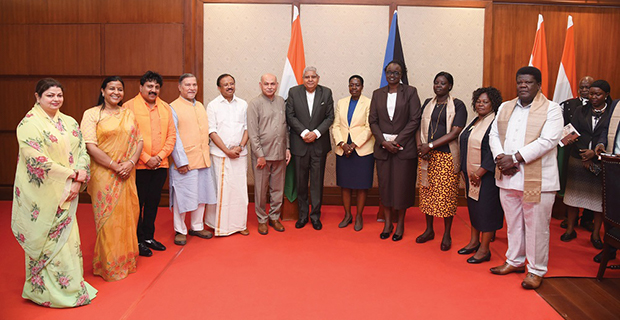“India at forefront of humanitarian assistance in South Sudan”
H.E. Mr Vishnu Kumar Sharma, Ambassador, Embassy of India, Juba, responded to questions from Yogesh Sood, Diplomatic and Business Editor on India’s bilateral relations with South Sudan.
Given that South Sudan has a transitional Government in place, what is the nature of bilateral ties between India and this Central Eastern African nation?
India was one of the first countries to recognize South Sudanese as an independent country and upgrade its Consulate in Juba as an Embassy in March 2012. India was also one of the first countries where South Sudan opened its Embassy (in August 2012). The fact that there is a transitional government in South Sudan has no bearing on our full fledged bilateral ties and the two countries enjoy a cordial and multifaceted relationship. India has been in the forefront in providing humanitarian assistance to South Sudan and has so far mainly focused on capacity building of the new countries through Indian Technical and Economic Cooperation and other training programmes and providing Indian Council for Cultural Relations scholarships. Several development projects earmarked for South Sudan could not take off mainly due to the precarious security situation in the country.
A Peace Agreement has been in place since September 2018 between various warring factions of South Sudan. How would you describe the current civilian situation in South Sudan?
The Revitalized Peace Agreement signed between main warring parties of South Sudan is a power sharing agreement among Sudan People’s Liberation Movement (SPLM), SPLM-In Opposition and three other factions. The present coalition government was formed in February 2020 based on the power sharing formula. The main mandate of the transitional government is to unify the warring armed groups into national army, draft a new constitution, constitute various national institutions and conduct elections to hand over the power to an elected government by February 2025. The ceasefire has been more or less holding among the political partners in the government but sub-national communal violence continues in some areas of South Sudan seriously hampering development. South Sudan is one of the poorest countries in the world, with two-third of its population in dire need of humanitarian assistance.
In the absence of a bilateral agreement between India and Sudan, the main basis of functioning becomes the MoU on the Foreign Office Consultation signed between the two nations. When do you expect the first meeting to be held in Juba?
The MoU on Foreign Office Consultation (FOC) was signed in 2019 between the two countries. The first FOC (to take place in Juba) has been delayed first due to Covid-19 pandemic and then due to international pressure on the South Sudanese government to expedite the implementation of the peace agreement, which has been lagging behind the schedule so far.
Kindly talk us through some of the high-level inter-governmental visits that have taken place in recent times…
From the Indian side, Shri V. Muraleedharan, Minister of State and Parliamentary Affairs visited Juba in October, 2021, which gave a fillip to the relations. From the South Sudanese side, Vice President H.E. Dr. James Wani Igga led a delegation in July 2022 to attend the CII-EXIM India-Africa Growth Partnership Conclave, and the Speaker of Transitional National Assembly Rt. Hon. Jemma Nunu Kumba led a parliamentary delegation to India in April 2023. South Sudanese Ministers have been regularly travelling to India to attend various international conferences/expos etc.
Is any trade delegation from India being planned for South Sudan by any of our leading chambers of commerce?
As of now, there is no concrete proposal for any visit by a trade delegation from India.
Please talk us through the extent of bilateral trade between the two countries, and the main Indian investments in South Sudan?
India’s trade with South Sudan is sparse. The main items of Indian imports from South Sudan are oil and timber, whereas India’s exports mainly comprise consumer and household goods, food items, pharmaceuticals, motorcycles and three wheelers. As the trade is mainly through third countries (Uganda, Kenya, UAE), precise data of the same are not available. Bilateral trade figures with South Sudan over the last three years (from the Department of Commerce of India website), are as follows:

South Sudan is a landlocked country with low disposable incomes. Apart from lack of infrastructure and capacity in different sectors, security and funding crunch are major impediments in growth of bilateral trade with India.
ONGC-Videsh has invested USD2.5 billion in Sudan Sudan/South in the oil sector. Apart from this, there are Indian hotels, borehole/construction companies, supermarkets and printing presses owned by Indians.
Is medical tourism on the increase from South Sudan to India?
South Sudanese travel to India mostly for medical treatment or higher education. The number of medical and student visas has been rising over the years. The Mission issued total 533 medical/medical attendant visas and 744 student visas in 2022 (out of total 1,619 visas issued)
What is the role you see being played by NRIs and PIOs in cementing ties with South Sudan?
South Sudan has a vibrant Indian community comprising around 1000 NRIs. They are engaged primarily in hospitality, trade, real estate, construction, retail outlets, printing press, contract supply to UN /NGOs, oil and IT Sector. While contributing to the growth braving numerous challenges, through their charitable and philanthropic activities they have earned immense goodwill for themselves. The Indian peacekeepers in the UN Mission, apart from their mandated peacekeeping operations, also regularly undertake public welfare activities such as veterinary camps and capacity building. Our Indian religious organizations, such as Daughters of Mary Immaculate, have also made a remarkable impact on peace and security by creating livelihood opportunities through their community support and vocational training. Overall Indians have played a vital role in building an impressive brand image of India.











Comments.